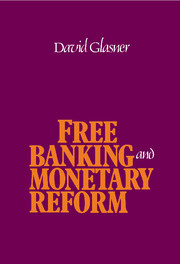Book contents
- Frontmatter
- Contents
- Preface
- Acknowledgments
- PART I A THEORY OF MONETARY INSTITUTIONS
- PART II THE UNCERTAIN PROGRESS OF MONETARY THEORY AND MONETARY REFORM
- 3 The classical theory of money
- 4 The quantity theory of money
- 5 The heyday of the gold standard, 1879–1914
- 6 The Great War, the Great Depression, and the gold standard
- 7 The Keynesian revolution and the Monetarist counterrevolution
- PART III A COMPETITIVE MONETARY REGIME
- References
- Index
5 - The heyday of the gold standard, 1879–1914
Published online by Cambridge University Press: 16 September 2009
- Frontmatter
- Contents
- Preface
- Acknowledgments
- PART I A THEORY OF MONETARY INSTITUTIONS
- PART II THE UNCERTAIN PROGRESS OF MONETARY THEORY AND MONETARY REFORM
- 3 The classical theory of money
- 4 The quantity theory of money
- 5 The heyday of the gold standard, 1879–1914
- 6 The Great War, the Great Depression, and the gold standard
- 7 The Keynesian revolution and the Monetarist counterrevolution
- PART III A COMPETITIVE MONETARY REGIME
- References
- Index
Summary
What an extraordinary episode in the economic progress of man that age was which came to an end in August, 1914! … The inhabitant of London could order by telephone, sipping his morning tea in bed, the various products of the whole earth, in such quantity as he might see fit, and reasonably expect their early delivery upon his doorstep; he could at the same moment and by the same means adventure his wealth in the natural resources and new enterprises of any quarter of the world, and share, without exertion or even trouble, in their prospective fruits and advantages. … He could secure forthwith, if he wished it, cheap and comfortable means of transit to any country or climate without passport or other formality, could despatch his servant to the neighboring office of a bank for such supply of the precious metals as might seem convenient, and could then proceed abroad to foreign quarters, without knowledge of their religion, language, or customs, bearing coined wealth upon his person, and would consider himself greatly aggrieved and much surprised at the least interference. But most important of all, he regarded this state of affairs as normal, certain, and permanent, except in the direction of further improvement, and any deviation from it as aberrant, scandalous, and avoidable.
J. M. Keynes, The Economic Consequences of Peace- Type
- Chapter
- Information
- Free Banking and Monetary Reform , pp. 92 - 108Publisher: Cambridge University PressPrint publication year: 1989



